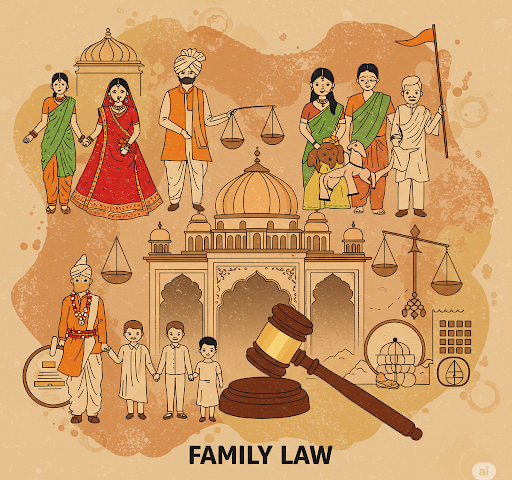- Top-rated Best Lawyer in Ghaziabad
- +91 9616166166
- [email protected]

Understanding Article 142 of the Indian Constitution: The Supreme Court’s Power to Do “Complete Justice”
May 7, 2025
Decree, Judgment, and Order under CPC: A Simplified Legal Guide
May 20, 2025Types of Family Law in India: A Comprehensive Overview
Family is the foundation of society, and naturally, the laws governing family matters are crucial to maintaining social order. Family law in India is unique because it is deeply influenced by religious customs, traditions, and personal beliefs. As a result, India has a pluralistic system where different communities are governed by their own sets of laws in matters like marriage, divorce, inheritance, and adoption.
Let’s take a closer look at the different types of family law in India.
Hindu Family Law
Hindu family law applies to Hindus, Buddhists, Jains, and Sikhs. It is governed by several important statutes, including:
- The Hindu Marriage Act, 1955: Regulates marriage and divorce among Hindus.
- The Hindu Succession Act, 1956: Deals with matters of inheritance and property rights.
- The Hindu Adoption and Maintenance Act, 1956: Covers rules for legal adoption and maintenance of dependents.
- The Hindu Minority and Guardianship Act, 1956: Provides guidelines for guardianship of minors.
Hindu family law is a blend of ancient customs and modern reforms, aiming to bring equality and justice, especially regarding women’s rights in property and marriage.
Muslim Family Law
Muslim family law is primarily based on the principles of Sharia (Islamic law) and is governed by personal laws along with some codified statutes:
- The Muslim Personal Law (Shariat) Application Act, 1937: Directs the application of Sharia to marriage, succession, inheritance, and charities among Muslims.
- The Dissolution of Muslim Marriages Act, 1939: Specifies grounds on which a Muslim woman can seek divorce.
- Muslim Women (Protection of Rights on Divorce) Act, 1986: Provides for the rights of Muslim women after divorce.
Matters like marriage (Nikah), divorce (Talaq), maintenance (Nafaqa), and inheritance are deeply rooted in religious practices, but there have been reforms to align with constitutional rights, such as the Supreme Court's verdict on Triple Talaq.
Christian Family Law
Family law for Christians in India is regulated through various statutes, such as:
- The Indian Christian Marriage Act, 1872: Governs the marriage of Christian individuals in India.
- The Indian Divorce Act, 1869: Lays down the rules for divorce among Christians.
- The Succession Act, 1925: Applies to Christians for matters related to inheritance.
Christian family laws have been influenced by English law and focus on formalities like registration of marriage and detailed grounds for divorce.
Parsi Family Law
The Parsi community has its own distinct family laws:
- The Parsi Marriage and Divorce Act, 1936: Regulates marriage and divorce within the Parsi community.
- The Indian Succession Act, 1925: Also governs inheritance among Parsis.
This set of laws emphasizes unique Parsi customs, especially related to matrimonial courts (Parsi Matrimonial Courts) established specifically for handling their family disputes.
Secular or Uniform Family Laws
In addition to personal laws, India also has secular family laws applicable to all citizens, irrespective of their religion: The Special Marriage Act, 1954: Allows people from different religions or those wishing to marry outside religious formalities to register their marriage legally.
- The Guardians and Wards Act, 1890: A secular law dealing with guardianship of minors.
- The Juvenile Justice (Care and Protection of Children) Act, 2015: Governs adoption across all religions.
These laws promote secularism, providing options for interfaith marriages and uniform procedures for adoption and guardianship.
Read more: Family Lawyer in Ghaziabad | Ghaziabad District Court
Conclusion:
Family law in India is a fascinating mix of diversity and unity. While religious personal laws cater to the unique traditions of different communities, secular laws ensure that all Indians have the option to live by common civil principles. As India evolves, discussions around a Uniform Civil Code (UCC) continue to gain momentum, aiming for a single set of family laws for all citizens to promote equality and national integration.
Family law remains a vital area of Indian jurisprudence, balancing tradition, modernity, and constitutional values.


